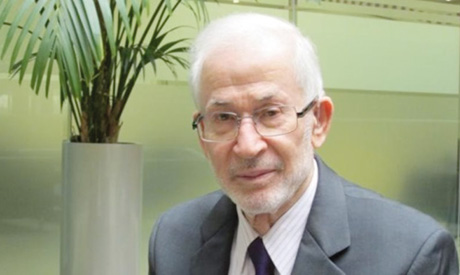
The Muslim Brotherhood has appointed Ibrahim Mounir as acting supreme guide, according to reports.
Following the arrest of Mahmoud Ezzat on 28 August several news sources have reported that the Muslim Brotherhood has appointed Ibrahim Mounir as acting supreme guide.
While the Muslim Brotherhood has yet to confirm this officially a number of Brotherhood affiliated websites have issued appeals to members to rally behind Mounir as the Brotherhood’s acting chief and a leaked document, attributed to the Muslim Brotherhood leadership, urged the group’s officials in Egypt to explain to younger members the circumstances surrounding the selection of Mounir as acting supreme guide.
The reports and leaks raise many questions. Is the information they contain reliable? Is it true that Mounir is now acting supreme guide? To what extent does the leaked document reflect a brewing organisational crisis now being manifested in widespread opposition to the choice of Mounir as leader?
It is likely that the selection of Mounir was less the product of a decision-making process than a result of the fact he was nominated first deputy supreme guide by Ezzat, leads the Brotherhood’s London Bureau, and controls a goodly portion of the group’s finances.
Mounir is a key leader of the group’s old guard. He is a supporter of the Mustafa Mashhour trend, named after the Brotherhood’s fifth supreme guide, the founder of the group’s international wing. Mounir worked in the Brotherhood’s paramilitary wing and in 1965 was defendant number 30 in the case brought against Sayed Qotb and other Brotherhood members for conspiring against the state.
Though handed a death sentences in the case it was commuted to life imprisonment and he was eventually released in 1975. In 2009, in a separate case, he was tried and sentenced to five years, only to be released in August 2012 under an amnesty issued by Mohamed Morsi.
Mounir served as third deputy supreme guide under Mahdi Akef, the group’s seventh supreme guide, and now that Ezzat has joined Khairat Al-Shater in prison he is the only deputy supreme guide not behind bars. This suggests the reports he has now been chosen to fill the top job are indeed true, regardless of the group’s bylaw that states the supreme guide must be resident in Egypt.
It is likely to be a contentious choice within the group. Together with the Muslim Brotherhood’s secretary-general Mahmoud Hussein, Mounir has been accused of corruption. In a leaked recording of a meeting of Brotherhood leaders who fled to Turkey, Muslim Brotherhood Shura Council member Amir Bassam accused both Mounir and Hussein of embezzling donations and other Brotherhood funds.
Mounir’s elevation to acting supreme guide is likely to exacerbate the generational divides that are already fracturing the group. He has little support among younger Brothers, and was named in a document of ideological retractions produced by imprisoned younger members of the group that openly blamed the Brotherhood’s old guard for the plight of the organisation. Mounir responded in a televised interview in which he said no one had forced the old guard’s critics to join the organisation, that it was not the Brotherhood that had put the young members in prison, and roundly rejected the reconciliation initiatives and other overtures the young Brothers were making to the Egyptian government.
His response served only to inflame the generational divides within the Brotherhood. Amr Darrag commented, “the guy’s in his 80s and making idiotic statements,” and demanded Mounir either explain his remarks or issue an apology.
There are any number of signs that tensions between Mounir and the Brotherhood’s middle tier leaders and younger members have sharpened since this bad-tempered exchange. It is telling that accompanying reports of Mounir’s rise a notice to the Brotherhood’s administrative branches was leaked instructing them to contain the anger of young Brothers and remind them of the organisation’s code of obedience.
Equally telling is the fact that the Muslim Brotherhood has not yet officially announced Mounir’s promotion through its official spokesman or on its Facebook page. The delay is probably an attempt to buy time to quash the anger that surfaced as soon as Mounir’s name was mooted as Ezzat’s successor or, if containment failed, to allow for an alternative to be selected from the Brotherhood’s Shura Council. Mahmoud Al-Beheiri and Ibrahim Al-Zayat are among the possible candidates.
In short, the Muslim Brotherhood is on the threshold of a crisis more profound than the clampdowns in the 1960s and the collapse of Muslim Brotherhood rule on 3 July 2013. The arrest of Ezzat and the succession question is bringing to a head seething tensions in the organisation’s hierarchy as well as regional divides between the Brotherhood’s chapters in the Arab and Islamic world. The organisation is poised on the brink of violent schisms that could well herald its disintegration and collapse.
*A version of this article appears in print in the 10 September, 2020 edition of Al-Ahram Weekly
Short link: